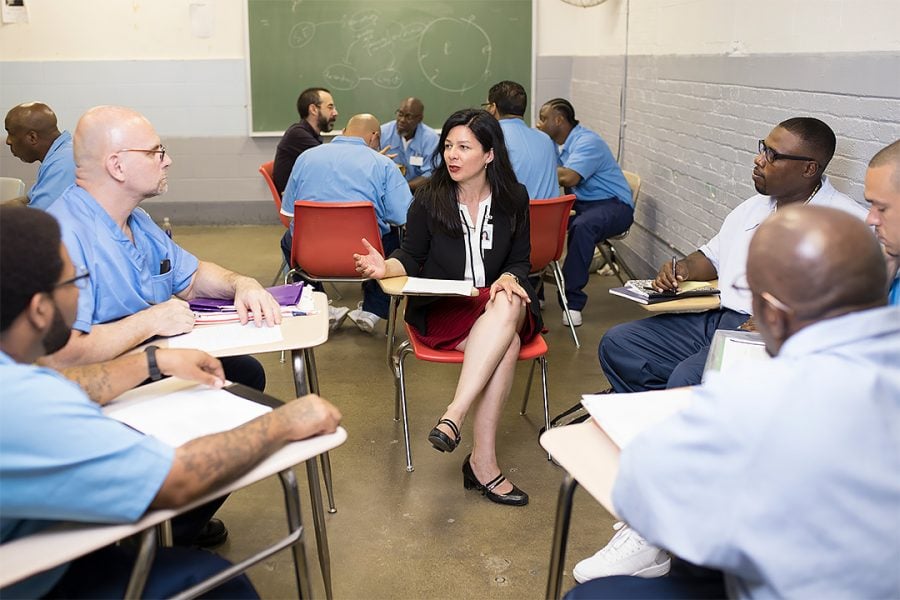Stateville inmates draw parallels between prison life, dystopian fiction at One Book event
Philosophy Prof. Jennifer Lackey leads a class at Stateville Correctional Center. Lackey and One Book One Northwestern volunteers visited the prison Wednesday to lead a discussion with inmates on “The Handmaid’s Tale.”
February 21, 2019
CREST HILL, Ill. — In “The Handmaid’s Tale” by Margaret Atwood, women in the dystopian society of Gilead are stripped of their power, left without control over their lives and bodies.
Demetrice Crite, an inmate at Stateville Correctional Center, said he understands a little bit of that feeling.
“Loss of control is loss of freedom,” Crite said. “We see that every day.”
On Wednesday, Crite and about 35 other inmates gathered alongside Northwestern faculty, undergraduates and graduate students for a discussion of Atwood’s novel, which was this year’s One Book One Northwestern selection. This was the second year One Book partnered with philosophy Prof. Jennifer Lackey, who leads the Northwestern Prison Education Program, to bring a literary discussion to the maximum-security prison.
Correctional officers patrolled the room and watched from lookouts jutting from the auditorium walls as participants heard from a panel and broke into small-group sessions.
One Book director Nancy Cunniff said she initially wasn’t sure how the discussion of Atwood’s female-centric book would play out at an all-male prison. However, Stateville students were quick to connect the plot with their own lives.
Crite said he saw parallels between the strictly-controlled lives of the book’s “handmaids” — fertile women forced into bearing children for the powerful families of Gilead — and his own day-to-day routine as an inmate. Though he sometimes feels like he is free to make decisions, at any moment, Crite said he might be ordered to step to the other side of a line, or have to wait for an officer to escort him somewhere, and realize he has no real autonomy.
Still, like Offred, the protagonist in “The Handmaid’s Tale,” he said he refuses to fully surrender to his situation.
“Take my body, because in time you’ll find, I’m totally opposed to surrendering my mind,” he said, reciting part of a poem he had written in response to his life in prison.
Robert Boyd also said he related to the handmaids and the government’s control over them. People trying to dictate where handmaids go and who they talk to reminded Boyd of being ordered around by prison guards.
After reading about the struggles of the women of Gilead, Tyrone Daniels said he was prompted to think about being mindful of the women in his life. Though he doesn’t feel like he has to be a “knight in shining armor” swooping in to save them, Daniels said he hopes he can lift their voices and protect them from being devalued or oppressed.
Crite added that the book made him gain even more respect for his mother — whom he referred to as his “superhero” — and the difficulties she faced as a single mother raising seven children.
Boyd said for him, it was hard to accept the premise of “The Handmaid’s Tale” because he doesn’t believe a society would allow things to progress that far. There’s “no question” he would stand up against the oppression placed on women in the novel, he said.
Even though he found the book was “not realistic,” he said he appreciated the dialogue it sparked and the chance to gain new perspectives through the event.
“You get to relate to human beings as human beings,” Boyd said. “Jail teaches you not to take that for granted.”
Corzell Cole said he is grateful for the opportunity to participate in One Book One Northwestern discussions. Cole, who has been a part of the NU Prison Education Program since it began, said it’s the one place at Stateville where he gets to let his guard down. Spending time with the other Stateville students, who share similar goals and values, makes Cole feel safe in a way that is rare in a prison environment.
“When they put on events like this, it brings me to tears,” Cole said. “This is more of a family than anything else.”
Email: [email protected]
Twitter: @madsburk
Related stories:
— Northwestern launches prison education program, will provide college credits to inmates
— One Book leads discussion on equality, freedom in maximum security prison
— “Handmaid’s Tale” author Margaret Atwood speaks at Northwestern


